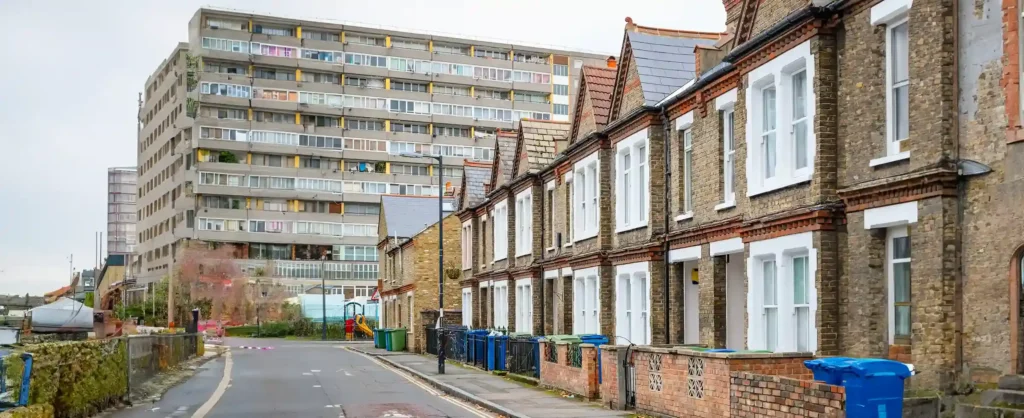At its financial core, affordable housing just makes sense for property investors.
According to a 2023 UK Real Estate Market Outlook by CBRE, the affordable housing sector has not only remained strong despite recent financial uncertainty but is also likely to see an increased amount of partnerships between housing developers and private capital due to the growing gap between sector demand and government supply.
With the recent Labour Party victory in the July 4th general election, affordable housing is expected to see a resurgence in funding and commitment. Already, the Labour government has outlined its plans to build 1.5 million new homes – a campaign promise that will likely be expanded upon tomorrow in the King’s Speech. Should legislation be introduced to reinforce this promise, the public sector focus on addressing the social housing deficit left by the outgoing government may present a unique opportunity for property investors.
Interested in building more affordable housing into your portfolio? Here are three reasons affordable housing is a worthy investment in 2024.
What is Affordable Housing?
According to the property website Zoopla, affordable housing is residential property that is available to buy or to rent specifically for people whose needs are not met by the housing market. The official UK Government definition suggests that affordable housing must be provided at a level at which mortgage payments are greater than the amount that would be paid in rent on council housing while remaining below market levels.
Affordable housing encompasses a number of individual schemes, including
- Shared Ownership
- Rent to Buy
- Social Rent
- Affordable Rent
Affordable housing schemes are typically funded and subsidised by the government to help offset the cost of private sector housing and maintain a decent standard in the housing market.
Reasons to Invest in Affordable Housing
1. Major Demand Means Major Returns
According to the Office for National Statistics (ONS), 59,175 affordable homes were completed in England between 2021 and 2022. While this marked an increase of 13% since 2019-20, a 2023 report by the National Housing Federation (NHF) tells a different story – one in which an estimated 8.5 million people in England are unable to access the housing they need. Whatever housebuilding metrics might say, the unfortunate truth is that demand for affordable housing is outpacing supply by a significant margin and forcing an overreliance on suboptimal temporary or private-sector alternatives.
Evidence for the growing unmet demand for affordable housing can be found everywhere. According to the NHF, 1.88 million people on the social housing waiting list are there due to affordability problems. A further 3.4 million people reported being pushed not poverty by their housing costs and a recent BBC News report has suggested that demand has risen so much that modern renters are competing with 20 others to view a single home, almost triple the number of viewing requests in 2019. The need for affordable housing, however, is a systemic one that can only be lessened by a real commitment to meeting, or even exceeding housebuilding targets.
That is where property investors and landlords who branch into affordable housing projects stand to make consistent, recession-proof profits.
A 2023 report on closing the gap in the affordable housing market by Octopus Real Estate suggests that registered providers of social housing can expect a 22% reduction in their development pipelines due to rising construction costs and interest rates. As landlords and property investors are forced to tackle net zero targets and disrepair by retrofitting their existing homes, however, equity partnerships between registered providers and private investors are expected to introduce new opportunities for innovation and construction growth.
According to a survey by Inside Housing, 49% of property investors were more likely to work with For-Profit Registered Providers (FPRPs) and equity partners in 2023 than in 2022. Considering FPRPs currently own more than 28,000 affordable homes in England, representing a disproportionate 35% increase since 2022, it stands to reason that interest in government and private sector partnerships to meet affordable housing demand will only increase in time.
2. The Private Rented Sector Falls Short
In the private rented sector, those searching for affordable housing and rent schemes are often disappointed by what they find. This can often mean landlords using inflated rent costs to cover rising mortgage interest rates, but a more harmful obstacle renters have had to contend with in recent years is inadequate housing quality.
According to a 2023 article from the Guardian, a quarter of UK private renters have become “overburdened” by their housing costs, with over 40% spending half of their income on them. Were this not enough, the share of people living in poor-quality housing is significantly higher in the UK than the EU average, effectively making England the worst place in the developed world to find good-quality housing. This has only worsened in the past year, with the UK since being declared both the worst value for money of any advanced economy and one of the worst countries in the developed world for homelessness.
In addition to the socioeconomic pressures facing the housing market, many of the solutions proposed under the Conservative government have since been quietly dismantled or swept under the rug. After months of being stalled in parliament, the Renters Reform Bill was shelved despite earlier promises to abolish no-fault evictions before the general election. With 25% of existing private rented sector homes still falling below the Decent Homes Standard and an increasing number of tenants being subjected to no-fault evictions, the need for affordable housing investment has never been more apparent. In any case, private investors could well be the deciding factor in Labour’s plans to drive affordable housebuilding
3. It’s Easier Than Ever!
The affordable housing market is at an economic turning point.
In London, Mayor Sadiq Khan is lobbying for £2.2 billion in funding as part of an emergency stimulus package to boost affordable housebuilding. In her first speech as chancellor, Rachel Reeves also indicated that Labour would commit itself to getting Britain “building again” through a combination of major infrastructure projects and the requalification of green belt land. Overall, the current political climate in the UK is heavily geared towards a resurgence in housebuilding with a renewed focus on housing affordability.
Besides these recent political developments, upcoming changes to minimum EPC standards mean savvy investors could seize one of the many opportunities to buy into affordable housing as more financial and political attention is turned to it.
What Impact Can Investing in Affordable Housing Have?
The positive effects of investing in affordable housing extend beyond providing stable and secure housing for some of the UK’s most vulnerable renters and homebuyers.
A 2023 study carried out by the Greater London Authority (GLA) shows that increases in the supply of affordable housing can not only lower general housing costs in the long term, but also increase the affordability of other housing in the short term. This indirectly makes homes in the surrounding area more available, especially to low-income households.
Further research reinforces from housing charity Shelter reinforces the importance of affordable housing with findings including:
- 21% of 18 to 44-year-olds without children are delaying starting a family due to a lack of affordable housing
- 28% of people in the UK have reduced their spend on food to cover their rising housing costs
- 5.6 million people in the UK have claimed that high housing costs affect their ability to move for employment
- 50% of renters do not believe that they will ever be able to afford a home in their local area
- 44% of people in the UK think the next Government should prioritise the supply of affordable homes.
This not only suggests that affordable housing has an impact on the general affordability and quality of life experienced by people in the UK, but also that impact investing in affordable housing could drastically improve lives while meeting heavy market demand.
How to Invest in Affordable Housing
According to research on equity investment in affordable housing by Savills, the current need for investor capital among for-profit registered providers (FPRPs) is on the rise. Ownership of affordable homes by FPRPs rose by 35% in 2023, with investor appetite for affordable homes forecasting continued growth this year. In fact, JLL research forecasts that private capital will account for one in five new affordable homes by 2026.
While there are many FPRPs and real estate companies that offer social and affordable housing investment opportunities, these can often be inaccessible due to heavy competition, extreme demand and a persistent shortfall in supply.
Concept Capital Group offers an affordable, readily accessible alternative to affordable housing investment built to demand. Our properties actively contribute to the affordable housebuilding with a streamlined process that minimises the cost for investors.
For more on what investing in affordable housebuilding can bring to your portfolio, contact our team today.













